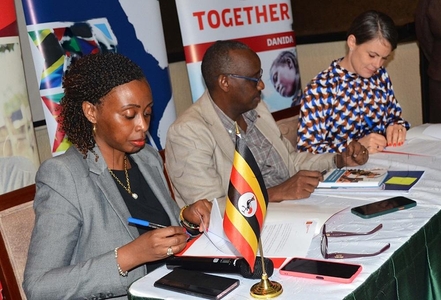Summary:
- Denmark and TradeMark Africa have signed a shillings 16.5 billion deal, named the Uganda Trade Support Project 2023/2024, aiming to enhance Uganda’s trade by strengthening export quality management systems and constructing a climate-resilient border market at Elegu.
Denmark and TradeMark Africa have inked a shillings 16.5 billion deal to upscale Uganda’s trade.
The Royal Danish Embassy in Kampala, through the Danish International Dev’t Agency (DANIDA), signed on behalf of Denmark. The agreement of a five-year project is intended to boost Uganda’s trade.
Code-named Uganda Trade Support Project 2023/2024, it targets to strengthen government export quality management systems for compliance with International sanitary standards.
Let Us Build Your Online Success!
We are the experts in creating visually stunning and functional websites. With reliable hosting and exceptional customer support, we bring your vision to life. Join hundreds of happy clients who trust us!
Get Started Now📞 Call/WhatsApp: +256 207 800 192
In her remarks at the signing of the bilateral agreement at Sheraton Kampala Hotel, Danish Ambassador to Uganda Signe Windining Albjerg noted that the project will support the construction of a climate-resilient, gender and disability-responsive border market at Elegu.
She emphasised that this will enhance trade in the region and enable adaptation to extreme weather conditions.
“In Uganda today, we are faced with a real problem of trade hindered by the effect of climate change, specifically floods, also at the Elegu border. Elegu border is mainly characterised by informal trade. 63% of the Elegu market traders are women of which 70% trade in agricultural-related products,” said the diplomat.
Albjerg remarked that traders in Elegu market have over the years suffered losses due to regular fire outbreaks, with the most recent one in February 2022 adding that these are real problems that need to be addressed.
She added that the project will support the process of accreditation of the three Uganda National Bureau of Standards (UNBS) decentralised testing labs. ;The ambassador said the labs, which they constructed in the last period, will reduce the turnaround time and cost of testing samples of products for export.
“I had the pleasure of opening such a lab in Mbarara early this year and I saw the quality of the testing material; I heard from the local businesses the significance of bringing the labs to where they produce,” the envoy said, adding ;”So, now we are taking it further to make sure they are accredited and our expectation is it will significantly reduce the turnaround time and the cost of sampling for the products for exports.”
Certification is now regional
UNBS deputy executive director standards Patricia Bageine Ejalu, explained that UNBS was supplied with equipment in all regional labs in Gulu, Mbale and Mbarara.
The areas where these labs are and greater areas beyond were able to take samples to those labs without coming to Kampala.
“Previously, we had the certification activities where they would collect samples and transport them to Kampala, but now they all get tested there,” Ejalu said.
“You can apply for certification within that region, our systems are online and samples can be delivered to the regional lab. This has helped us very much for the western region.
She noted that “the western region had enormous dairy products, with a lot of the milk processed at the factory is actually exported. ;Such certification services are done, and they can get the service without coming to Kampala. In the Northern Region we have the green oil seeds and honey and so they are all able to do the testing and get certification from that side”.
Albjerg on Thursday explained that they will convene actors and support work on the new European Union deforestation regulation, which poses a challenge to the private sector especially those in the coffee and cocoa sector.
She said the grant is part of the large country programme DKK 650 million that Denmark has signed with the government of Uganda for the period 2023-2028 to support interventions aimed at promoting a green, sustainable and inclusive economic transformation to adapt to the global climate crisis. And promoting sustainable and durable solutions for refugees and supporting Uganda’s stabilising role in the region.
Denmark has over the years contributed to Uganda’s path to becoming a middle-income country through support to agriculture and trade facilitation.
The country director Uganda and South Sudan TradeMark Africa (TMA), Anna Nambooze, said under the new strategy. they will contribute to an increased number of decent jobs, improved incomes, food security and climate resilience of trade infrastructure which ultimately benefits Uganda’s poor women, men, and youth.
“We are optimistic that the Uganda Trade Support project positively complements other TMA interventions in realising these objectives,’ she said.
The executive director Private Sector Foundation Uganda (PSFU), Stephen Asiimwe said DANIDA’s support will contribute to TMA support to Uganda’s public and private sector, which will enable a competitive private sector as Uganda joins Regional Economic Communities (RECs).

